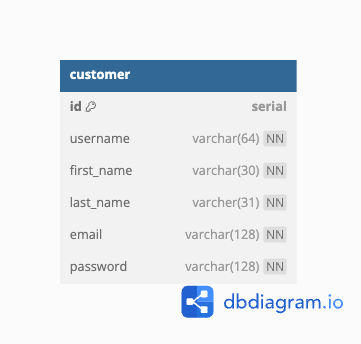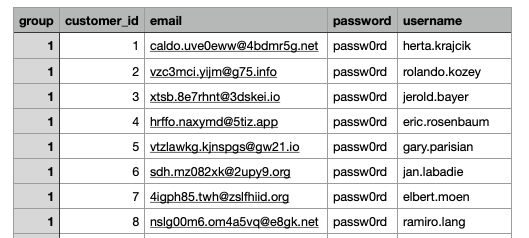Create Your Data Flow
When testing or validating data flows, we frequently encounter the need to generate specific datasets. To accomplish this, we can leverage both user data input and extra data file. By combining these two features and coordinating input and output files, we can create interconnected data generation processes that seamlessly integrate with our desired data flow.
The following is an example of creating data to simulate a customer email update scenario.
Environment
Assume your application stores customer data in a PostgreSQL database table like the one below:

Your application also exposes two Restful endpoints to update customer data:
POST /customers/auth: This endpoint authenticates the customer and returns a token.
{
"user": "username - text",
"password": "password - text"
}
PUT /customers/password: This endpoint updates the customer's email.
{
"id": "customer id in database - integer",
"email": "current email - text",
"newEmail": "new email - text"
}
Stepped Data Generation
Step 1: Generate Database Records
First we can generate customer database records using the following rules:
- username is formed by join firstname and lastname with a dot.
- password for all test records is "passw0rd" and the password in the database is hashed using bcrypt.
- Customer Record Schema File
- Customer Record Plan File
- Customer Record Output File
name: "extra_output_1"
entities:
- name: "customer"
properties:
- name: "id"
type: "sequence"
index:
id: 0
- name: "email"
type: "text"
- name: "first_name"
type: "text"
- name: "last_name"
type: "text"
- name: "username"
type: "text"
- name: "name"
type: "text"
- name: "raw_password"
type: "text"
- name: "password"
type: "text"
name: "extra_output_1"
dialect: "postgresql"
schema: "extra_output_1"
data:
- entity: "customer"
count: 30
properties:
- name: "email"
constraints:
- type: "category"
name: "email"
- name: "first_name"
constraints:
- type: "category"
name: "name"
qualifier: "firstname"
- name: "last_name"
constraints:
- type: "category"
name: "name"
qualifier: "lastname"
- name: "username"
constraints:
- type: "alternation"
properties:
- "first_name"
- "last_name"
formula: "STRING_CASE(first_name + '.' + last_name, 'lower')"
- name: "name"
constraints:
- type: "alternation"
properties:
- "first_name"
- "last_name"
formula: "first_name + ' ' + last_name"
- name: "raw_password"
defaultValue: "passw0rd"
- name: "password"
constraints:
- type: "alternation"
properties:
- "raw_password"
formula: "BCRYPT(raw_password)"
name: "extra_output_1"
entities:
- name: "customer"
properties:
- name: "first_name"
hide: true
- name: "last_name"
hide: true
- name: "raw_password"
hide: true
extra: |
type: "csv"
content:
- label: "group"
value: "1"
valueType: "number"
- value: "customer"
valueType: "entity"
properties:
- name: "id"
label: "customer_id"
- name: "email"
- name: "raw_password"
label: "password"
- name: "username"
Above files can be downloaded from the following links:
Two files will be generated in this step:
- customer_0.sql - SQL file to insert customer records into the database.
- extra.csv - CSV file to be used in the next step.
Sample snippet of the extra.csv file:

Step 2: Generate Email Update Requests
Apart from using the extra.csv from the step 1 as the Data CSV File, we can generate email update requests for test customer records by applying configurations files below:
- Apply Data File Schema
- Apply Data File Plan
- Apply Data File Output
name: "extra_output_2"
entities:
- name: "my_data"
properties:
- name: "customer_id"
type: "sequence"
- name: "password"
type: "text"
- name: "username"
type: "text"
- name: "email"
type: "text"
- name: "group"
type: "number"
- name: "updated_customer"
properties:
- name: "id"
type: "sequence"
reference:
entity: "my_data"
property: "customer_id"
linked: "customer_id"
- name: "password"
type: "text"
reference:
entity: "my_data"
property: "password"
linked: "customer_id"
- name: "username"
type: "text"
reference:
entity: "my_data"
property: "username"
linked: "customer_id"
- name: "email"
type: "text"
reference:
entity: "my_data"
property: "email"
linked: "customer_id"
- name: "new_email"
type: "text"
name: "extra_output_2"
dialect: "postgresql"
schema: "extra_output_2"
data:
- entity: "updated_customer"
count: 30
properties:
- name: "id"
referenceStrategy: "loop"
- name: "new_email"
constraints:
- type: "category"
name: "email"
name: "extra_output_2"
entities:
- name: "updated_customer"
alias: "customer"
properties:
- name: "password"
hide: true
- name: "username"
hide: true
extra: |
type: "json"
content:
- label: "loginRequests"
valueType: "entity"
value: "updated_customer"
properties:
- name: "username"
label: "user"
- name: "password"
- label: "updateEmailRequests"
valueType: "entity"
value: "updated_customer"
properties:
- name: "id"
- name: "email"
- name: "new_email"
label: "newEmail"
Downloadable version of the files:
Other than the regular data files, an extra json file will be generated in this step:
- extra.json - JSON file to be used in the test scenario.
Payload of the final json file looks like the following:
{
"updateEmailRequests" : [ {
"newEmail" : "mxyx.u1stw6a@pea1zeuz.inc",
"id" : 1,
"email" : "caldo.uve0eww@4bdmr5g.net"
}, {
"newEmail" : "hxusf.l2hqoi@wxpzfm.info",
"id" : 2,
"email" : "vzc3mci.yijm@g75.info"
}, {
"newEmail" : "lzevix.upw@2d3vmn.net",
"id" : 3,
"email" : "xtsb.8e7rhnt@3dskei.io"
}, {
"newEmail" : "zlixdcg.edwpe@8nef.com",
"id" : 4,
"email" : "hrffo.naxymd@5tiz.app"
}, {
"newEmail" : "owve.z8i7@pvlvsiw.org",
"id" : 5,
"email" : "vtzlawkg.kjnspgs@gw21.io"
}, {
"newEmail" : "4ytps8f.ivhren@axldzz7r.org",
"id" : 6,
"email" : "sdh.mz082xk@2upy9.org"
}, {
"newEmail" : "koquyzo.ded3@3ae.com",
"id" : 7,
"email" : "4igph85.twh@zslfhiid.org"
}, {
"newEmail" : "dsq.nsgt@spom.inc",
"id" : 8,
"email" : "nslg00m6.om4a5vq@e8gk.net"
}],
"loginRequests" : [{
"password" : "passw0rd",
"user" : "herta.krajcik"
}, {
"password" : "passw0rd",
"user" : "rolando.kozey"
}, {
"password" : "passw0rd",
"user" : "jerold.bayer"
}, {
"password" : "passw0rd",
"user" : "eric.rosenbaum"
}, {
"password" : "passw0rd",
"user" : "gary.parisian"
}, {
"password" : "passw0rd",
"user" : "jan.labadie"
}, {
"password" : "passw0rd",
"user" : "elbert.moen"
}, {
"password" : "passw0rd",
"user" : "ramiro.lang"
}]
}